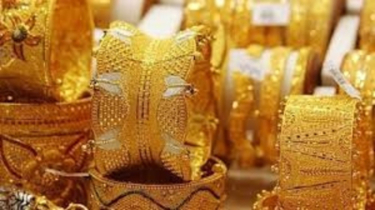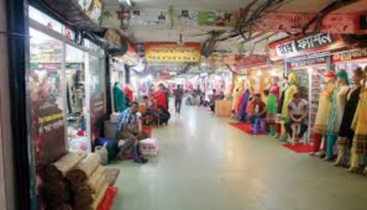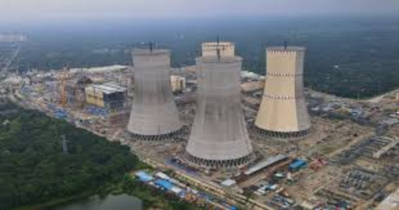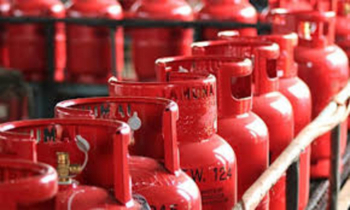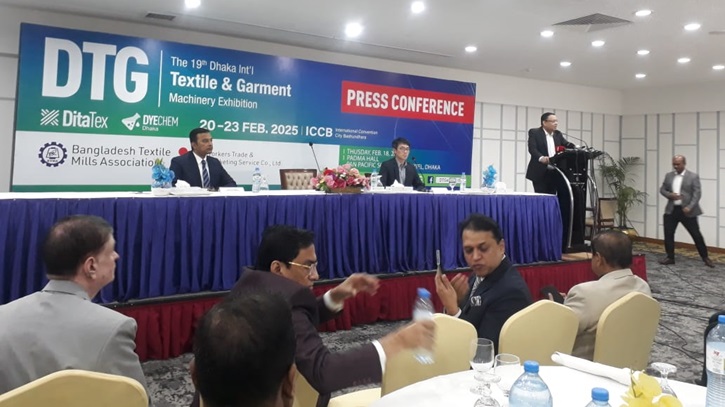
Photo: Business Eye
The much-anticipated 19th Dhaka International Textile and Garment Machinery Exhibition (DTG 2025) will be held from February 20 to 23, 2025, at the International Convention City Bashundhara (ICCB) in Dhaka. Organized by the Bangladesh Textile Mills Association (BTMA), the exhibition is poised to become a pivotal event for the future of Bangladesh’s textile industry. With over 1,100 exhibitors from 33 countries showcasing the latest innovations in textile technology, DTG 2025 is set to provide a dynamic platform for growth, sustainability, and innovation in the sector.
At a press conference held on February 18 (Tuesday), BTMA President Showkat Aziz Russell emphasized the significance of this year's exhibition. He noted that the event offers a unique opportunity for local entrepreneurs to familiarize themselves with modern machinery and technological advancements. He highlighted that the exhibition would not only allow industry professionals to explore the newest innovations but also provide a much-needed boost to the growth of Bangladesh’s textile sector. Khokon stressed that local businesses would gain invaluable exposure to technological advancements that could drive their development sustainably and improve productivity in the long term.
One of the key features of the exhibition is the participation of notable global leaders in textile machinery, including VANDEWIELE, in collaboration with Shaj Corporation. This partnership underscores the importance of DTG 2025 as a venue where both local and international companies can present groundbreaking technologies. These innovations could have a profound impact on the local textile industry, enabling it to remain competitive on the global stage.
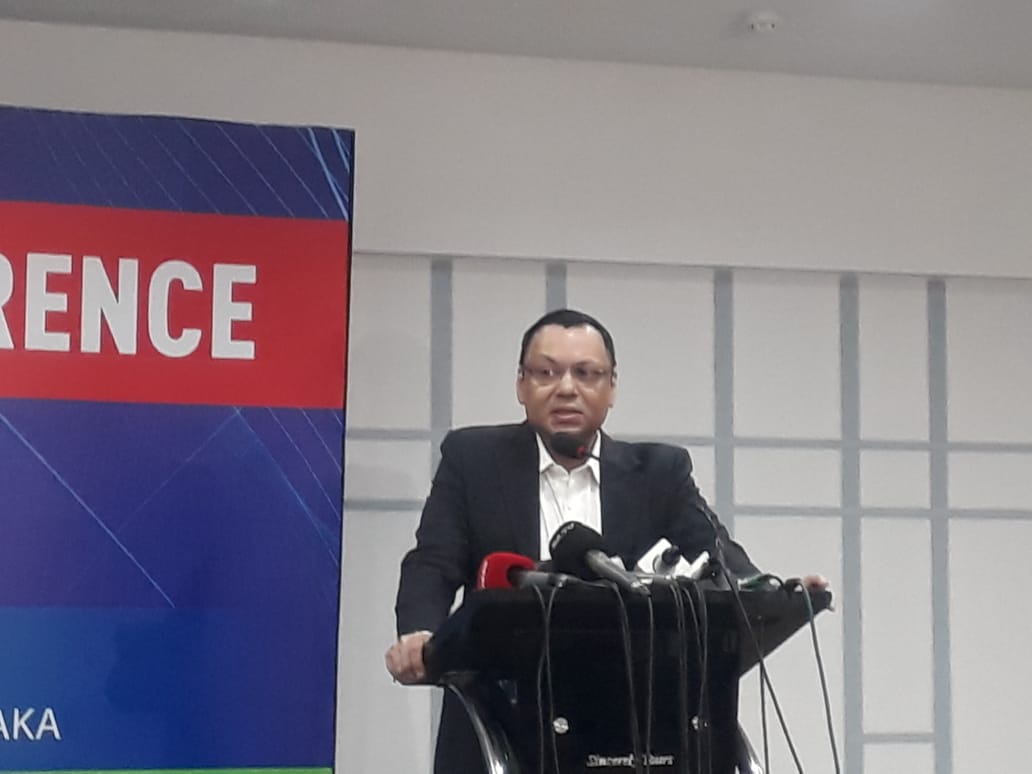 While addressing the press conference, Russell responded to various questions from journalists, focusing particularly on the ongoing gas supply issues affecting the textile industry. He urged the government to reconsider the recent gas price hike, which was implemented under the promise of a stable and uninterrupted gas supply. However, Khokon pointed out that despite the price increase last year, the supply remained unreliable, and gas pressure has been insufficient in key textile-producing areas such as Chattogram, Savar, Ashulia, Gazipur, Araihazar, and Narayanganj. He mentioned that for over a month, the gas supply in these areas has been operating at very low pressure, leading to disruptions in production and posing a significant challenge for the industry.
While addressing the press conference, Russell responded to various questions from journalists, focusing particularly on the ongoing gas supply issues affecting the textile industry. He urged the government to reconsider the recent gas price hike, which was implemented under the promise of a stable and uninterrupted gas supply. However, Khokon pointed out that despite the price increase last year, the supply remained unreliable, and gas pressure has been insufficient in key textile-producing areas such as Chattogram, Savar, Ashulia, Gazipur, Araihazar, and Narayanganj. He mentioned that for over a month, the gas supply in these areas has been operating at very low pressure, leading to disruptions in production and posing a significant challenge for the industry.
Showkat Aziz Russell also revealed that several mills in Narayanganj have been facing a complete suspension of gas supply for the last 15 days, bringing their production to a near halt. Even in cases where intermittent gas supply has been restored, fluctuations in pressure have caused damage to the machinery, further disrupting production. Khokon noted that despite these challenges, textile mills are still required to pay high minimum gas bills, which has added to the financial strain on the industry.
The impact of these issues has been far-reaching, with Showkat Aziz Russell stating that the lack of production has resulted in uncertainty regarding the timely payment of workers' salaries. He also expressed concern that unless the government ensures a stable supply of energy, both electricity and gas, it will be difficult to attract new investments into the textile sector, which is crucial for the industry's continued growth.
DTG 2025 will feature over 1,100 global companies and 1,600 booths, representing 32 countries. These exhibitors will showcase cutting-edge technologies in textile machinery, including advances in apparel accessories, dyes, and chemical machinery. Among the returning participants is Shima Seiki, a renowned Japanese innovator in computerized flat knitting technology, marking its fifteenth consecutive year at the exhibition. This demonstrates the company's continued confidence in Bangladesh’s growing textile industry and its importance as a major market for textile manufacturing.
The exhibition will also host two concurrent events: DitaTex, focusing on textile and apparel accessories, and DyeChem, which will highlight innovations in dyeing and chemical technologies. These supplementary events will provide additional opportunities for industry professionals to explore advancements in their respective fields, further enriching the exhibition experience.
DTG 2025 will be open to all industry stakeholders, including textile manufacturers, garment producers, machinery importers, distributors, and agents. Visitors can pre-register online to receive an admission QR code, simplifying the entry process and ensuring a smooth experience at the venue. The ICCB, a state-of-the-art exhibition facility, will provide ample space and modern amenities, ensuring that the event runs efficiently and professionally.
For the textile industry, DTG 2025 represents more than just a showcase of machinery. It serves as a critical opportunity for growth and transformation, allowing businesses to explore new technologies and trends that will define the future of the sector. The exhibition also fosters an environment for networking, enabling stakeholders to forge valuable business partnerships and collaborations that will benefit the industry for years to come.
As Bangladesh continues to solidify its position as a global leader in textile production, events like DTG 2025 are essential for maintaining momentum and driving innovation. The exhibition provides a unique platform for local manufacturers to engage with global leaders, learn about emerging technologies, and adapt to changing market demands. For the country's textile industry to remain competitive in an increasingly tech-driven world, it is essential to invest in new technologies, sustainability practices, and workforce development.
A textile industry specialist suggested that businesses view DTG 2025 not only as a marketplace for machinery but as a learning hub. The exhibition offers a chance to gain insights into how cutting-edge innovations can be integrated into existing operations to improve efficiency, reduce costs, and enhance product quality. The specialist also emphasized the importance of exploring green technologies, as sustainability becomes a driving force in global markets. By adopting energy-efficient machinery, waste-reduction technologies, and sustainable materials, businesses can contribute to environmental preservation while improving long-term profitability.
The future of the textile industry is being shaped today, and DTG 2025 will play a crucial role in that transformation. Stakeholders in the industry—whether manufacturers, suppliers, or investors—must embrace this opportunity to position themselves for success in the rapidly evolving global textile landscape. By adopting the right technologies and practices now, businesses can ensure their place at the forefront of the industry for years to come.
DTG 2025 promises to be a landmark event in Bangladesh’s textile industry, providing invaluable opportunities for growth, innovation, and networking. With a focus on technological advancements, sustainability, and industry collaboration, the exhibition is poised to help drive Bangladesh’s textile sector into the future, cementing its place as a global leader in textile manufacturing.
U

.png)


